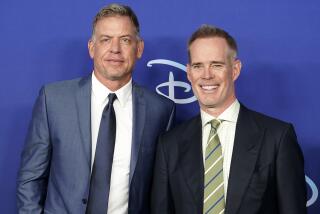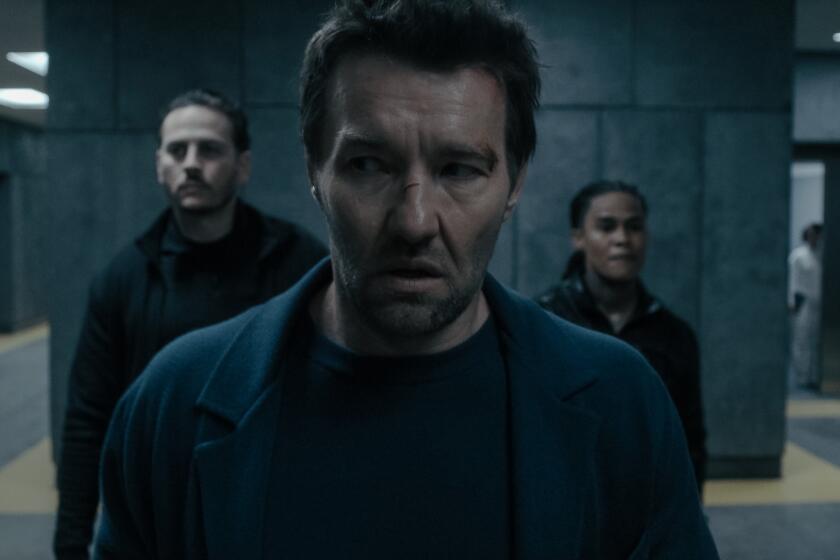NBC’s ‘Sunday Night Football’ minds X’s and O’s to stay No. 1
NEW YORK — When NBC kicks off the new season of “Sunday Night Football” with a special telecast of the New York Giants-Dallas Cowboys game Wednesday, it will do so wearing an unfamiliar badge of honor: the highest-rated show on television.
An average of 20.7 million viewers tuned in to “SNF” during the prime-time TV season last year, as the program outdrew seven-year champion “American Idol” and became the first weekly sports program to claim the most-watched mantle. “SNF” also performed strongly in the coveted 18-49 demographic, averaging more than 8 million weekly viewers.
“We’d just like to maintain the ratings we had, and if something else comes along to beat us —” said NBC Sports Chairman Mark Lazarus, downplaying the pressure on this year’s broadcasts. Then he reversed course. “You know,” he said, “I would be disappointed if we weren’t the most watched show again.”
Lazarus, who took over for Dick Ebersol in the spring of 2011, was sitting in his corner office at NBC’s Rockefeller Center headquarters. Amid walls adorned with sports paraphernalia sat a particular totem, a framed poster proclaiming NBC’s broadcast of the 2012 Super Bowl (an extension of its Sunday night package) as the “Most Watched Show in Television History.”
Yet what now seems ironclad was hardly inevitable when the network began airing Sunday games six years ago. Ebersol took a gamble bringing the NFL to Sunday nights, committing $600 million per year at the time to a slot some considered ill-suited for gridiron action.
Many fans, the thinking went, were maxed out on football by the time Sunday night rolled around. And the time period was already chock-a-block with popular scripted series such as ABC’s “Desperate Housewives.” Ebersol decided to re-create “SNF” as, essentially, “Monday Night Football” on a new night — and with largely the same crew.
“Disney was letting football die on the vine,” recalled Fred Gaudelli, the former producer of Disney-owned ABC’s “Monday Night Football,” now in the same role for NBC. “It was clear to many of us it was time for a change.”
The producers’ vision for the studio show — grandly branded “Football Night in America” — consisted of low-key and at times even somber dissections from broadcasters Dan Patrick and Bob Costas and commentary from more thoughtful former players and coaches. At the moment, ex-Colts coach Tony Dungy is a standout.
“I was skeptical ‘Sunday Night Football’ could work, or at least work that quickly,” said Al Michaels, who is joined in the NBC booth by ex-Cincinnati Bengals wide receiver Cris Collinsworth.
And at first, it didn’t. The numbers were erratic as the show sought to undo long-held viewer habits. In fact, in NBC’s second year, “SNF’s” average viewership of 16 million was actually below ABC’s lackluster final season of “MNF.”
But “SNF” steadily gained fans. And in 2010, NBC saw a huge jump, as an average of 21.2 million people tuned in during the prime-time season. Only a strong year from “Idol” kept it from the top spot. “Sunday Night Football” also won the first of four live sports series Sports Emmys beginning in 2008.
Meanwhile, “Football Night in America” has increased viewership by 37% since its first season, to nearly 9 million viewers in 2011.
But NBC is only part of the reason for “SNF’s” success. The network has greatly benefited from an NFL eager to see the luster restored to a prime-time game broadcast, giving NBC every available advantage.
Chief among those advantages is “flex scheduling,” a kind of programming get-out-of-jail-free card that allows NBC, with some input from competing networks and the approval by the NFL, to cherry-pick a better game than the one it has scheduled. The network is also able to slot in a game of its choosing, again with NFL approval, in the final week of the regular season, which it did last year for a Giants-Cowboys contest; the game wound up being the most watched “SNF” broadcast of the regular season.
And even its principals acknowledge that NBC has reaped the rewards of football’s surge in general popularity. NFL viewership has skyrocketed in the last few years thanks to new rivalries and celebrities as well as the ever-growing footprint of fantasy leagues.
The news isn’t all good. Though “SNF” beat “Idol” for the first time ever last year, its numbers were actually down, by a little under 3%, compared with the previous year. And neither of the country’s two largest media markets, Los Angeles and New York, were among the top 20 “SNF” markets last year.
Those numbers are significant as NBC prepares to up its payment to the NFL to what is estimated will be nearly $1 billion per season beginning in 2014 for a contract that will run through 2022.
Meanwhile, the cloud of controversy hovers over the NFL as the 2012 season opens, from the ongoing class-action lawsuit over head injuries to the off-season scandal involving the New Orleans Saints’ bounty program.
To maintain its hold, NBC is making several key additions this fall.
For the first time, a broadcast network will air a Thanksgiving game in prime time, as NBC will show a third Turkey Day contest with a game between the rival New York Jets and New England Patriots. (The holiday’s evening game had previously aired on the NFL Network.)
And a 360-degree replay feature is being prepped — possibly ready, Gaudelli said, in time for Thanksgiving.
Still, producers will have their work cut out for them.
Garnering more than 20 million viewers means you’re bringing in many more casual and newer fans (“SNF” was, improbably, also the third-most-popular show among women ages 18-34. NBC Sports programming president John Miller credits cross-promotions on non-football sister properties such as Bravo and iVillage.) That doesn’t always square with a telecast aimed at the pigskin cognoscenti.
“It’s parallel lines, and sometimes they intersect,” Michaels said. “But in the booth you have to know when and how to go back and forth.”
And NBC knows that no matter how much finesse the production brings to it, there’s only so much it can do if the games end up lopsided. “It’s not really like most shows on television. It’s really as good or as bad as what’s on the field,” Lazarus said. “All we can do is document and enhance that.”
More to Read
The complete guide to home viewing
Get Screen Gab for everything about the TV shows and streaming movies everyone’s talking about.
You may occasionally receive promotional content from the Los Angeles Times.







